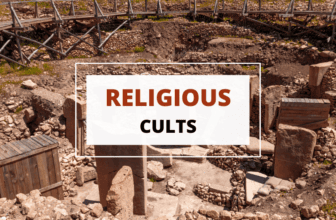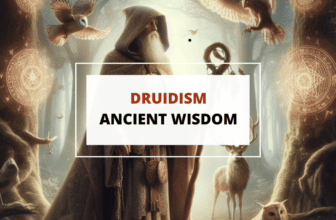
Table of Contents
English words come from various sources, as the language was shaped by the influence of many older as well as different languages and cultures. As you’d expect, this means that quite a lot of English words come from other religions and mythological cycles.
What might surprise you, however, is that the vast majority of them come from an ancient culture at the exact opposite end of Europe. So, which are the 10 most commonly used English words with mythological origins?
As with many other things in Europe, many of the origins origin of the words we’ll mention below is ancient Greece. That’s despite there being little to no direct contact between the ancient Britain and Greece, as Latin served as a mediator between the two cultures.
Panic from the Greek God Pan
The Greek god Pan is famous as the god of the wilderness, spontaneity, music, as well as shepherds and their flocks. None of this feels overly panicky, but god Pan was also known for his ability to exercise emotional control over people and drive them into bursts of significant fear, i.e. panic.
Echo as the Greek Mountain Nymph
Another common word many don’t realize that comes straight from Greek is echo. That’s the name of another mythological creature, this time a nymph.
Gorgeous, like most other nymphs, Echo caught the eye of the thunder god Zeus, the chief god of ancient Greece and husband to the goddess Hera. Angered that her husband was once again being unfaithful to her, Hera cursed the nymph Echo so that she would be unable to speak freely. From that moment on, Echo was only able to repeat the words others had spoken to her.
Cereal from the Name of the Roman Goddess of Agriculture
For a short switch to ancient Rome, cereal is a modern word that actually comes from the name of the goddess Ceres – the Roman goddess of agriculture. This connection hardly needs explanation as this agricultural goddess was also associated with grain crops – the very thing cereal is made of.
Erotic from The God Eros
Another Greek god whose name we use quite often is Eros, the Greek god of love and sexual desire. The word erotic comes straight from him even though there are other Greek deities of love and desire such as Aphrodite.
Charity from the Greek Charis or Graces
The word Charity comes from a lesser-known Greek deity or, in this case – from the Three Graces of Greek mythology. Named Aglaea (or Splendor), Euphrosyne (or Mirth), and Thalia or (Good Cheer), in Greek the Graces were called Charis (χάρις) or Charites. Known to symbolize charm, creativity, beauty, life, nature, and kindness, the Charites are often represented in old paintings and sculptures.
Music and Museas in The Ancient Greek Muses
We’ve grouped these two words together for the simple reason that they both come from the same place – the ancient Greek muses. Deities of both art and science, the muses’ name became a word for inspiration and artistic zest but it also became the modern word for music not just in English but in almost all European languages as well.
Funnily enough, the Old English word for music was actually drēam – i.e. the modern word dream. All other languages that use the word music today also have their own old terms equivalent to drēam which goes to show just how fitting muse/music is to have become established in so many cultures.
Fury as in The Greek Furies
A very similar linguistic transition happened with the word fury which comes from the Greek Furies – the goddesses of vengeance. Like music, fury traveled from Greek to Roman, then to French and German, and to English. Fury may not have become as universal as music but its variation can still be seen in numerous other European languages that also took it from Greek.
Cloth from the Name of One Of The Three Fates
Cloth is as common of a word today as it is a material, yet most people have no idea where the word comes from. However, many have heard of the three Greek Moirai or Fates – the Greek goddesses that were responsible for how the world’s fate was about to unfold, similar to the Norns in Norse mythology.
Well, one of the Greek Fates was named Clotho and she was the one responsible for spinning the thread of life. Knowing that, the “thread” between the goddess and the modern English word becomes obvious.
Mentor from the Odyssey
The word mentor in English is quite recognizable – a wise and inspiring teacher, someone who takes the student under their wing and not only teaches them something but “mentors” them – a much greater and fuller experience than just teaching.
Unlike most other terms on this list, mentor doesn’t come from the name of a god but of a character from Homer’s The Odyssey instead. In this epic poem, Mentor is a simple character whom Odysseys entrust with the education of his son.
Narcissism from the Narcissist
Narcissism is a term we often throw rather easily around, but it actually refers to a genuine personality disorder. About 5% of people on Earth are believed to have malignant narcissism – the harshest extreme of narcissism, with many others being on a spectrum between that and “normality”.
As serious as narcissism is, however, the term’s origins come from a rather simple Greek myth – that of Narcissus, a man so beautiful and full of himself that he literally fell in love with his own reflection and died of this addiction.
Other interesting English Words with Mythological Origins
Of course, there are much more than just ten words in the English language that come from the mythologies. Here are a few other examples you may be curious about:
- Europe – From the beautiful princess Europa that Zeus falls in love with
- Chronology – From the name of god Cronus the god of time
- Iridescent – From the name of the Greek goddess Iris, goddess of the rainbow
- Phobia – From the Greek god of fear Phobos
- Nectar – As in the Greek drink of the gods called nectar
- Mercurial – From the Roman god Mercury
- Zephyr – From the name of the Zephyrus, the Greek god of the west wind
- Jovial – Coming from the other name of the Roman god Jupiter – Jove
- Hermaphrodite – As in the Greek god Hermaphroditos, son of Aphrodite and Hermes, whose body was joined with that of a nymph
- Ocean – Funnily enough, this word comes from the name of the Greek god Okeanus who was a river god
- Atlas – From the famous titan who held the entire world on his shoulders
- Nemesis – This is the name of the Greek goddess Nemesis, a goddess of vengeance specifically against arrogant people
- Friday, Wednesday, Thursday, Tuesday, and Saturday – To take a break from all the Greek gods, these five days of the week are named after the Norse gods Frigg (Friday), Odin or Wotan (Wednesday), Thor (Thursday), Tyr or Tiw (Tuesday), and the Roman god Saturn (Saturday). The other two days of the week – Sunday and Monday – are named after the sun and the moon.
- Hypnosis – From the Greek god of sleep Hypnos
- Lethargy – As in the Greek river Lethe that flowed through the Underworld
- Typhoon – From Typhon, the father of all monsters in Greek mythology
- Chaos – As in the Greek Khaos, the cosmic void around the world
- Flora and Fauna – From the Roman goddess of flowers (Flora) and the Roman god of animals (Faunus)
- Heliotrope – As in the Greek titan Hêlios who controlled sunrises and sunsets
- Morphine – From Morpheus, the Greek god of sleep and dreams
- Tantalize – From the evil Greek king Tantalus
- Halcyon – As in the legendary Greek bird halcyon that could calm even the strongest winds and waves
- Lycanthrope – The first myth about lycanthropes or werewolves is that of the Greek man Lycaon who was punished to become a wolf because he had resorted to cannibalism.
In Conclusion
While English is a mix of multiple other languages such as Old English, Latin, Celtic, French, German, Norse, Danish, and more, most of the words coming from those cultures don’t have mythological origins. That’s largely because the Christian church didn’t want other religions influencing people’s everyday lives. It’s also probably because all these cultures were very close and well-known to the English people.
So, using religious and mythological terms from nearby cultures to form nouns, denominatives, adjectives, and other words would have felt strange to the English people. Taking words from ancient Greek, however, was more palatable. Most English people in the Middle Ages likely didn’t even realize where those words were from. To them, words such as echo, erotic, or mentor were either “traditional English words” or, at best, they thought those words came from Latin.
The end result is that we now have dozens of English words that are literally names of ancient Greek and Roman gods.








